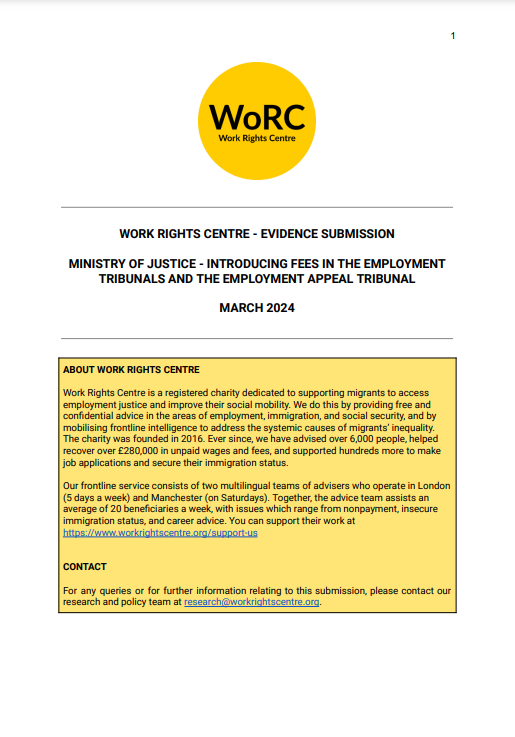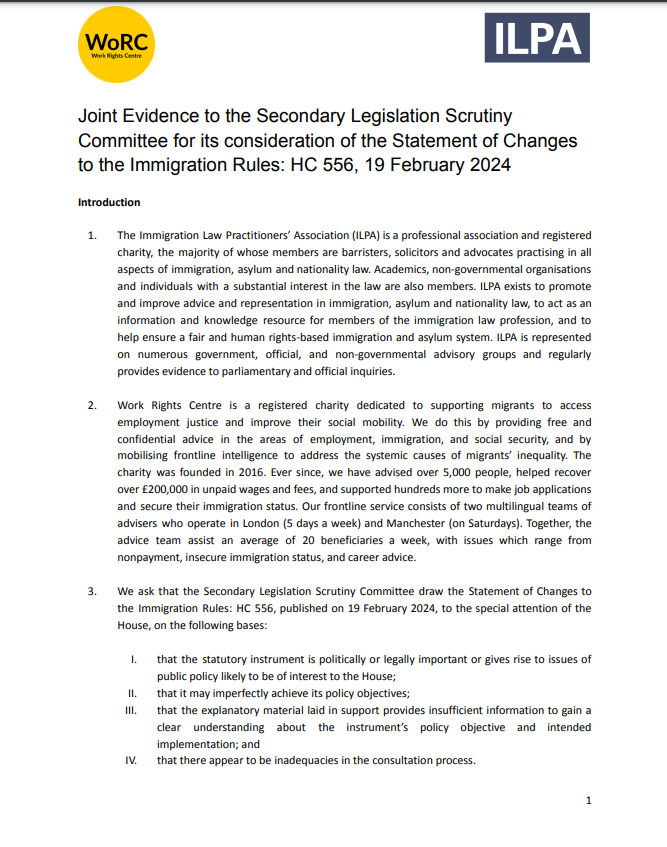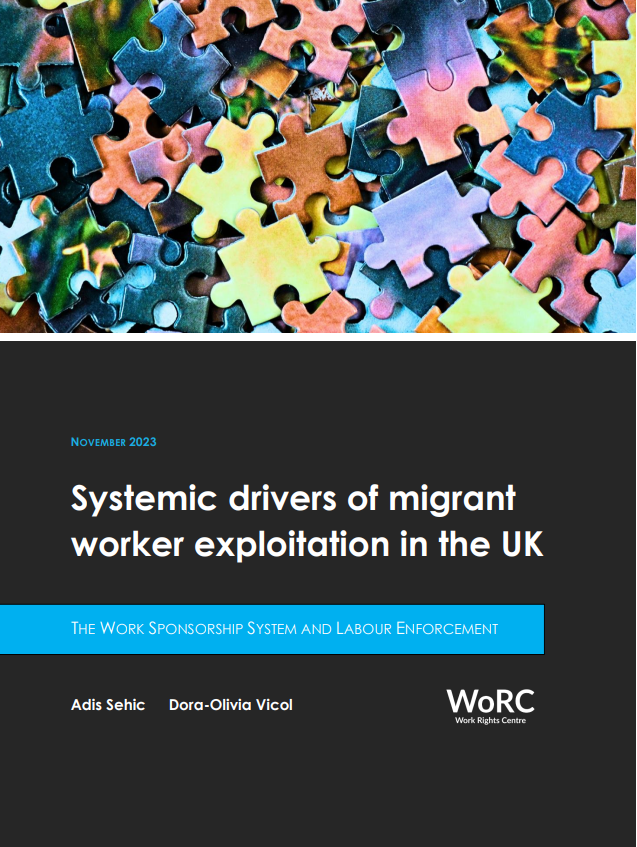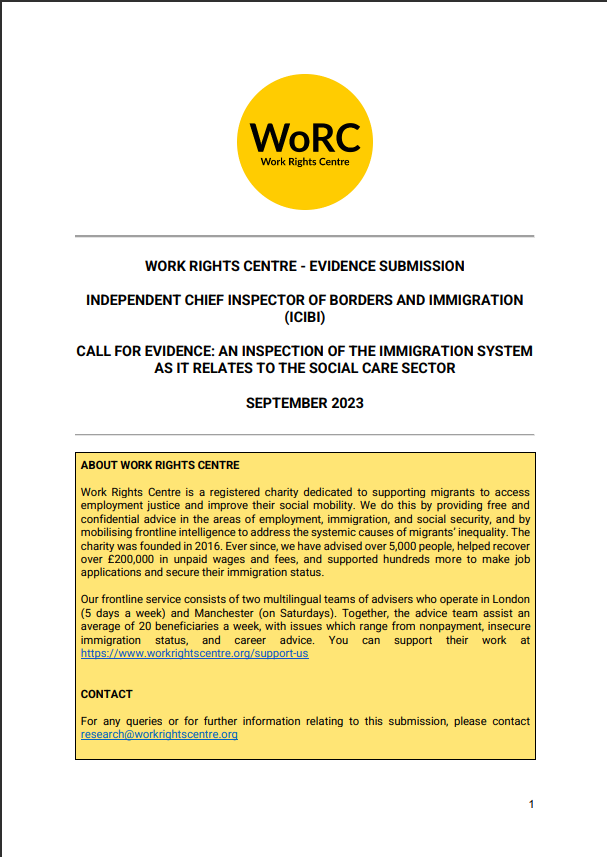Our Research
The Work Rights Centre exists to help migrants and disadvantaged Britons access employment justice and improve their social mobility. Every day, our team of multilingual advisers challenges employment rights breaches, provides employability and benefits advice, and helps people to secure their immigration status.
Another piece of the puzzle is bringing these issues to the attention of policymakers. Our data-led publications shed light on the systemic drivers of socioeconomic inequality and provide meaningful recommendations for how to address them.
Read our research reports and briefings. If you want to contact our team, use the form at the bottom of this page.

Our submission to the Ministry of Justice advising against the reintroduction of Employment Tribunal fees
(25 March 2024)
Our evidence to the Ministry of Justice on why the reintroduction of Employment Tribunal fees would exclude the poorest from accessing justice, increase pressures facing the third sector, and fail to alleviate pressures on the tribunal system.

Joint evidence to the Secondary Legislation Committee for its consideration of the Statement of Changes to the Immigration Rules: HC 556
(22 February 2024)
We have written to the Secondary Legislation Scrutiny Committee to request changes to the Ukraine Schemes and Health and Care visa are annulled.

Report: The systemic drivers of migrant worker exploitation in the UK
(14 November 2023)
Research from the Work Rights Centre identifies the work-sponsorship system adopted after Brexit, combined with weak labour enforcement, as the driving force behind increasing reports of migrant worker exploitation in Britain.

Evidence submission to the ICIBI's inquiry of the immigration system as it relates to the social care sector
(22 September 2023)
Today, the Work Rights Centre has submitted written evidence to the Independent Chief Inspector of Borders and Immigration (ICIBI) in relation to its inquiry of the immigration system as it relates to the social care sector.

Evidence submission to the DLME's Call for Evidence on the Labour Market Enforcement Strategy 2024/25
(04 September 2023)
Today, the Work Rights Centre has submitted written evidence to the Director of Labour Market Enforcement (DLME) in relation to its Labour Market Enforcement Strategy 2024/25

Evidence submission to the Migration Advisory Committee's Seasonal Worker Scheme visa inquiry
(26 July 2023)
The Work Rights Centre has submitted written evidence to the Migration Advisory Committee (MAC) in relation to its inquiry of the Seasonal Worker (SW) visa.

On the frontline : London councils' response to the humanitarian crisis in Ukraine
(10 January 2023)
This briefing looks at the UK's response to the humanitarian crisis in Ukraine through the lens and experiences of local authorities in London, exploring the pressures faced by councils and the effects this has had for Ukrainian arrivals in the UK.

Six months on: the UK's response to the humanitarian crisis in Ukraine, and how the government can better protect refugees
(27 September 2022)
Since the Russian military began its invasion of Ukraine in February 2022, the UK government has introduced three visa schemes for Ukrainian refugees. This report outlines the limitations of these schemes, focusing particularly on the acute risks of homelessness and poverty faced by Ukrainians in the UK.

Migrants and taxes: challenges of fiscal inclusion in the digital age
(02 September 2022)
How do migrants in the UK understand and navigate the tax system? What barriers exist when it comes to engaging with it? And why is fiscal inclusion so fundamentally important?
These were some of the questions posed by the 'Taxing Migrants' project, which brought together the expertise of front-line advisors from the Work Rights Centre with scholars of migration and tax at the University of Oxford (OSGA/COMPAS).

Seasonal work after the war in Ukraine
(18 June 2022)
In this briefing we take a close look at Seasonal Worker visas, using Home Office entry clearance data for Q1 2021 – Q1 2022, and examine what the numbers mean for workers and stakeholders engaged in the fight against labour exploitation.
What do the latest immigration trends tell us about workers’ countries of origin and how might labour enforcement agencies use this intelligence to buttress their prevention and investigation work?

Weed out exploitation: how to improve the reporting of labour exploitation, and protect the seasonal agricultural workers staffing Britain's farms
(02 March 2022)
Seasonal Agricultural workers are consistently flagged for being at severe risk of labour exploitation. Drawing on a year of casework with seasonal agricultural workers recruited under the government's Seasonal Worker Pilot, this briefing examines the barriers which prevent them from reporting exploitation, and the measures needed to address them.

The Employer Checking Service Needs Fixing
(02 September 2021)
The Employer Checking Service is an online service designed to help employers check the right to work for an applicant who is unable to provide them with a 'share code', either because their application is 'pending' or because of digital issues or technical difficulties. Both workers and employers desperately need a functioning process to enable them to prove and check their right to work, even when status is pending.
This briefing reviews some of the problems with the service and how they can be fixed.

Lives on Hold
(25 August 2021)
To protect their rights, EU nationals living in the UK by 31 December 2020 had to apply to the EU Settlement Scheme (EUSS) by 30th of June 2021 (with some exceptions for late applications). Since then, we have heard from hundreds of people reporting delays or difficulties in proving their status.
This briefing explores the issues experienced by EU citizens since the EUSS deadline, and how the Home Office, employers, and local authorities can help.

Year of Covid
(31 March 2021)
The year of Covid pushed migrant workers in the low skilled sector to the limit and prompted a real change in the issues brought to the attention of our advisers.
This report utilises frontline case data from 01 March 2020 to 10 March 2021 to examine the challenges they faced during the Coronavirus pandemic, and to make a series of policy recommendations to protect their rights and their livelihoods.
Contact our research team
If you'd like to learn more about our reports and methods, provide feedback, or discuss a research collaboration, we'd love to hear from you. Fill out the form below, and a member of our team will be in touch.